We Tried And Ranked Every Starbucks Reserve Select Winter 2023 Coffee Blend
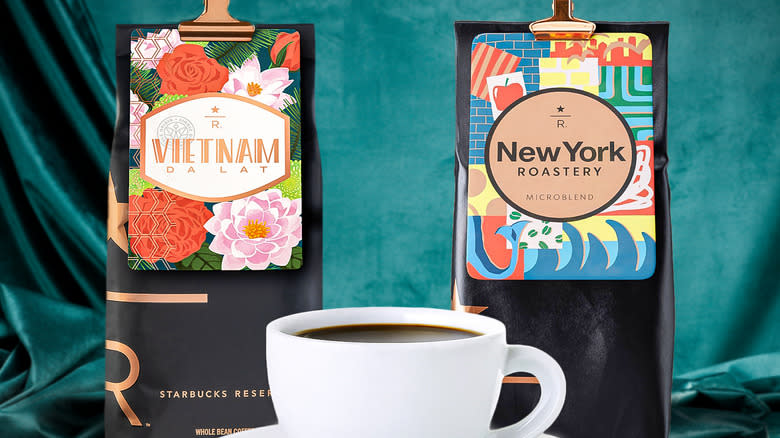
You might love Starbucks to the point where they're putting out gift cards with your face and (probably misspelled) name on them, but unless you live near a Starbucks Reserve location, you're missing out on some of the chain's best blends. The Reserve Blend offerings are constantly changing, as seasonal weather patterns, as well as terroir, affect the beans' final flavor. Starbucks master tasters and blenders are perpetually crafting the next great batch from locations around the globe to make these special coffee concoctions, which are only available at these premium locations. You won't be able to get these blends at every -- or even a select -- Starbucks location. They're exclusive to Reserves.
To rank the current spate of new releases, we headed down to the coffee chain's New York City Roastery. All Starbucks Roasteries are Reserve locations, though not all Reserve locations are Roasteries. The difference is that while Reserve spots feature these exclusive blends that don't all make it to the regular Starbucks locations, a Roastery is where those beans actually get roasted, ground, and otherwise processed into our collective caffeinated cup of addiction. So sampling them here ensures they're as fresh as it gets. And we can tell you there's definitely one flavor everyone should try, plus a couple that might meet your specific tastes.
These recommendations are based on our first-hand impressions of promotional materials and products provided by Starbucks.
Read more: 31 Coffee Brands, Ranked From Worst To Best
Starbucks Reserve Christmas Blend
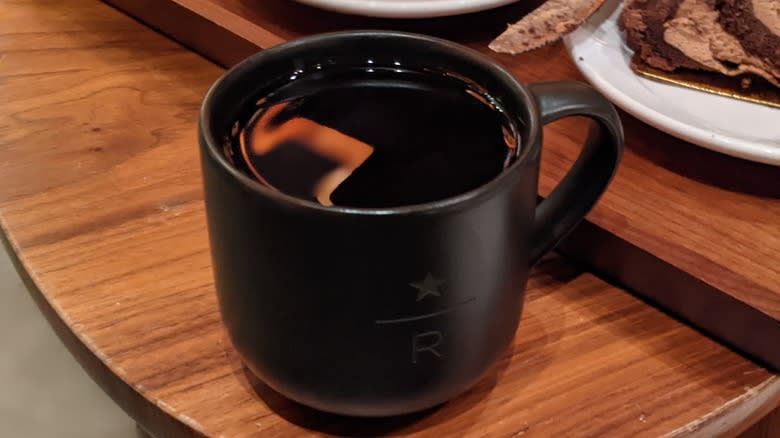
The official holiday pour of your red-cup refill, Reserve Christmas Blend is a medium roast that comes through very mild—perhaps even watery. More charitably, you might call it thin-bodied by design to stay drinkable for decaf types fueling up for, or from, a long day of exploring a city on their winter break. If you don't usually drink coffee, here's one that won't clobber your palate, though you'll still get your caffeine fix. However, java heads won't find much to cheer their Christmas in the low-test stuff.
The taste gets off to a soft start, with nothing at the forefront beyond a woodsy aroma more evident on the tongue than the nose. A lot of nut comes through after that, hand in hand with more wooden notes, like these beans just copied their homework from oak barrels and can't explain their work. Eventually, the drink reaches a moderately vigorous body with a pleasant bitterness, but we never detected the ginger or lemon that Starbucks suggests. Maybe it's mild enough to make you happy with a latte, whipped cream, and other carbo-loading winter adornments, but taken on its own, you have to ask what Starbucks was saving this one for.
New York Roastery Microblend
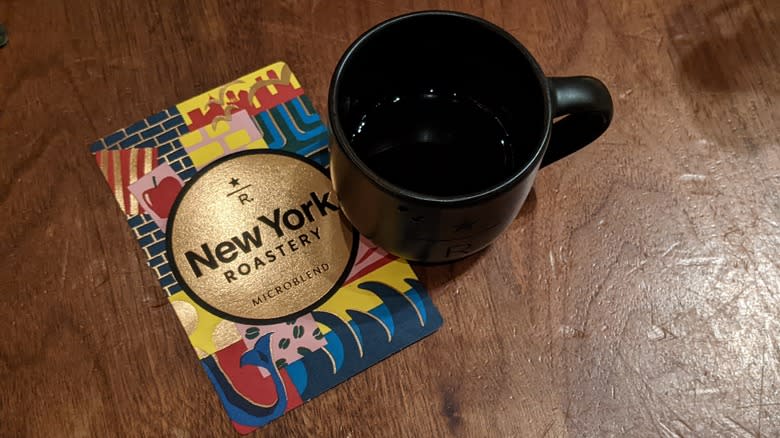
Made in New York for New York, there's a pekoe and orange blossom quality to this blend's aroma, but it's absent from the first taste, where a mild acidity develops into a medium body. There's some teak at the end, or at least a generic woodiness. Starbucks calls attention to Meyer lemon and a host of baking flavors, but we're not feeling any of those.
Calling this New York is an odd choice. If it's the devoted blend for the city, so be it, but it neither tastes like the elevated form of a standard New York coffee nor the elegance or raucousness that make it side by side here. Don't come into it expecting bold roast or body. This is a good coffee to pour 32 ounces of and take in your truck for whatever long day awaits you—not exactly a New York experience in a city where it can take 30 minutes to drive one mile east-west if you're crazy enough to go crosstown at rush hour.
Capping it off, the most familiar flavor that the New York roast brings to mind is Dunkin' Donuts. If you're a loyalist to the legacy of Fred, then congratulations: this is the much better version of that brew. But Starbucks should have marketed this as a Boston blend.
Vietnam Da Lat
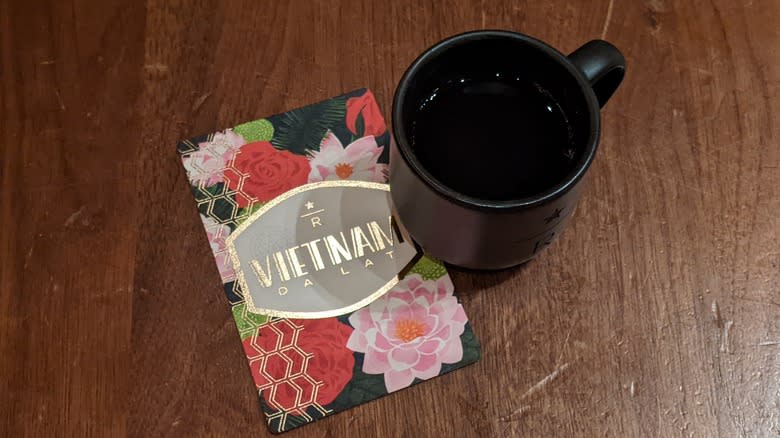
Pardon the synesthesia, but the Vietnamese-sourced coffee tastes ... well, higher pitched than New York. If you can't hear your coffee, then we'll say it's a little more refined despite being slightly stronger. It's simply more declarative in what it wants to be. In this, it tastes more like New York City's vibe than the New York blend. Vietnam is nicer (by a lot) and nuttier (but not by much). The reason may be in its processing.
Like the New York Roastery microblend, the Vietnam Da Lat is a washed coffee, meaning the fruit husk has been removed via water, rather than drying in the sun. The result is a nuttier coffee that showcases the bean itself, rather than its flesh. When the bean's a vehicle for its environmental factors to strut their influence, we think it's a smart call to let its natural, true self shine through. Vietnam Da Lat is a clear and quick level-up from New York Roastery Microblend, and the first pour we can actually recommend. If the New York blend is washed as well, its true character simply has less to show for itself.
Sumatra Wahana Estate
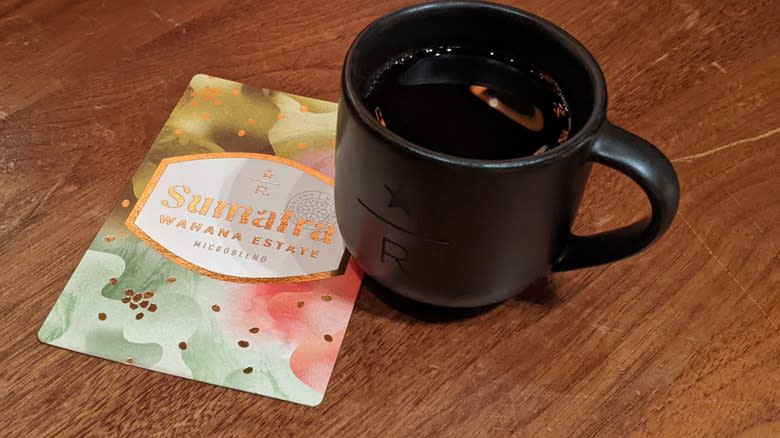
Oh yeah, that's the stuff. Rich and somehow separately lush, the Sumatra Wahana Estate blend is the one you want. We'd recommend this to anyone who likes a Kona roast. Perhaps we're tasting the terroir of volcanic soils, but there's a common mineral base here that we are very happy to encounter.
After that, you'll get a sense of a dense brown bread, then a meatiness. This might be what Starbucks's tasting notes refer to as syrupiness, but neither adjective really approaches the hearty final flourish of this excellent cup of coffee. Mostly, it just tastes like primo joe. If you're only going to get one cup of Reserve Blend, we say go for the gusto. Sumatra Wahana Estate satisfies the need for a really rich cup without going so strong as to scare away intermittent drinkers or those who prefer lighter flavor but might realize it can still include a richer body. It's truly a blend for everybody. This will keep you smiling long enough to get within sight of Pumpkin Spice Latte season again, though here's hoping spring and summer bring equally appealing options to keep our coffee contiguous.
Read the original article on Tasting Table.